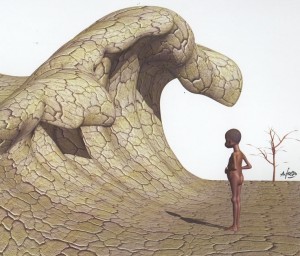
So I was sorting through the battered box where I toss odd scraps of to-be-filed-eventually paper, going back several years—notes, clippings, story ideas, now-cryptic messages to self—and there, among a clutch of Chick tracts in Spanish and out-of-date A&W coupons, were my scribbled notes from a debate I attended at the University of Calgary in 2010. The debaters were Dr. Richard Carrier, independent scholar of religion, and Michael Horner, part-time philosophy instructor at Trinity Western University, BC, and good buddy to William Lane Craig. The topic was “Is it reasonable to believe in god?”
As these things go, it was a pretty standard debate, following some deeply rutted tracks. Myself, I thought Carrier totally pwned Horner, who was about as impressive as a bowl of tapioca pudding; naturally, the true believers I chatted with afterwards took the opposite view. As far as I could tell, this was largely based on the fact that Horner used every possible opportunity to slip in a plug for salvation. My notes, deciphered and paraphrased (it was a dark room), include such gems as these from Horner’s side of the debate:
Atheists, who consider humans to be no more than animals, have no sense of human dignity.
God has a wonderful plan for everyone’s life.
Since God has given us free will, we can choose to rebel against God, or to follow His plan.
Atheists imagine the existence of evil disproves God or shows that God is not good; but evil is the result of humans rebelling against God’s plan.
Then came the problem of suffering, as distinct from the problem of evil. When pressed about why a theoretically benevolent and omnipotent deity would allow so many of his creatures to suffer so horribly, Horner’s answer boiled down to suffering may be part of God’s larger plan for one’s life; suffering strengthens and purifies, and may bring one closer to God. When asked how this might apply to starving children in the Third World, the answer was this: their suffering teaches us to be compassionate, and let God’s love flow through us to them.
This was the point of the debate where I remember being more disgusted than entertained. In combination with Horner’s previous utterances, it would seem that God’s wonderful plan for several million humans born each year is for them to live brief, famished, disease-ridden lives as teaching aids, so well-fed people like Michael Horner can learn to become better Christians.
Not much respect for human dignity in that. And somehow, I do not see those dead children as having had much opportunity to exercise their free will.
